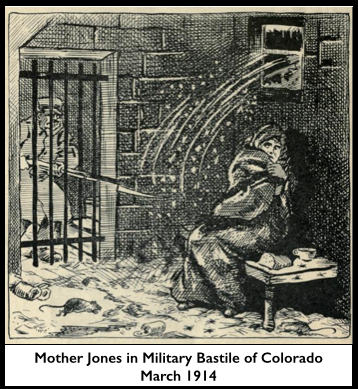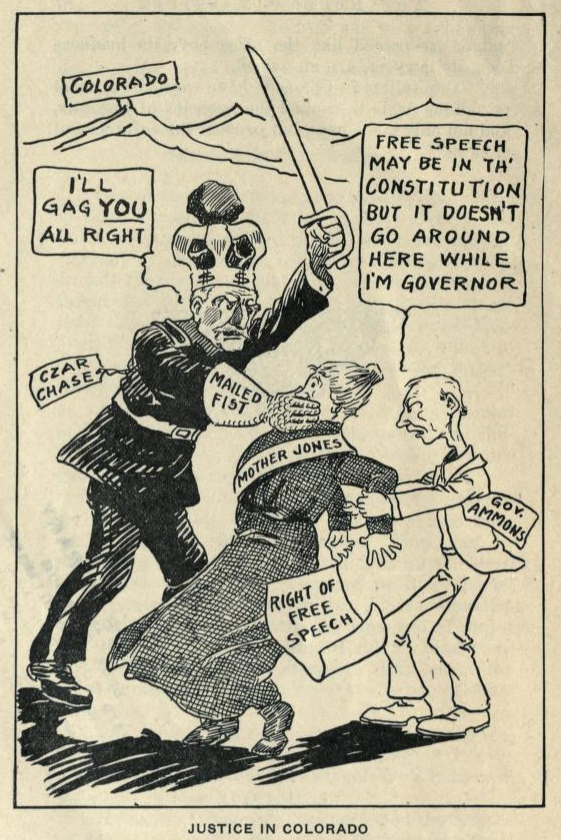You ought to be out raising hell.
This is the fighting age.
Put on your fighting clothes.
-Mother Jones
Hellraisers Journal, Friday November 23, 1917
Mother Jones News for October, Part II: Claude G. Bowers on Mother Jones

Claude G. Bowers, journalists, spent a few hours with Mother Jones while she was traveling from Colorado to Indianapolis sometime around October 19th (see Mother Jones News for October, part 1), and writes about that meeting for his column, “Kabbages and Kings.” Bowers notes that Mother “is not afraid of man or devil,” and as an example tells of her experiences in Colorado during the Colorado Coalfield Strike of 1913-1914. During that struggle, Mother was held for almost one month in the “Military Bastile,” a cold cellar cell which had already claimed the life of a miner held prisoner there. She counseled “her boys” not to attempt a rescue, “Maybe I can do some good in the bull pen,” she said.
From Fort Wayne Journal-Gazette of October 28, 1917:
[…..]
Mother Jones To-day
The other day I had the privilege of spending four hours with the most noted woman in the labor world who is idolized by every miner who goes down into the earth-Mother Jones-the “angel of the miners.” I had not seen her for a year and have often wondered what line her activities would take now that we are at war. She has risen to the occasion as every one who really knew her thought she would. She has already prevented and settled several strikes and is working in harmony with Garfield.
“That man Garfield is all right,” she said the other day, “a big man, with the right outlook, clean and strong and fair.”
She had just stopped off in Fort Wayne on her way from Denver to Indianapolis, had gone out of her way to furnish some material for a biography of Senator Kern which I am writing. And during the hours she was in Fort Wayne she did not rest, or appear in need of it. What a marvel of a woman. Now 84 years old, and running all about the country, losing sleep, eating what she can get in mining camps, swaying audiences of 10,000 with the greatest ease, walking up to the machine guns of the Baldwin-Felts guards and telling the guards what she thinks of them. Three years ago during the West Virginia strike she lead twenty women carrying babes who had been driven from shelter, fifteen miles down a railroad track at night in search of lodgings for them.
And she does not look a day older now than she did five years ago when I first saw her. Her voice which is heavy and rather masculine from years of addressing thousands of miners on the mountain sides is just as strong. Her eyes, which flash with real fire in discussing the wrongs of her boys, are just as bright, and she can shake her arm in gesticulation with just as much vigor. No organizer connected with the United Mine Workers has better judgment. She knows that during the period of the war the worse thing the organized miner can do is to go on a strike. A short time ago when the conditions were threatening in the west she secured authorization to go to Washington and effect a settlement there. She went, saw the president, who respects her, made her arrangements and returned to her boys who were assembled in convention. She knew that there were some among the miners who would oppose a settlement and she thinks these are the spies of the enemies of organized labor who are anxious to discredit the labor movement during the war. These began to grumble about surrendering to the operators, and she took the platform.
[She said:]
Boys, we have the greatest president and the justest president we have had since Lincoln. He has done more for the masses and has not done as much as he wants to do. He needs our help now. And he has earned it. Now every mother’s son of you that thinks it is up to us to stand by him by settling this strike stand up and give three cheers for the president of the United States.
And they did.
And the woman who did that was 84 years old-and she made herself heard more easily than any man in the room could have done. Her trail reaches from afar, from the far-away days when Kearney warmed things up in California in the fight on the Chinese, down through every mining camp between the seas, into the factory districts of cities from New York to San Francisco, and from appearances it would seem that the trail will lead on and on for many years. She has more eloquence than any man I ever heard. And she is just as eloquent in conversation as when brow-beating 10,000 infuriated men into disbanding to their homes in the mountains. And she is not afraid of man or devil.
Take this incident: She was in Washington and was told that the governor of Colorado had said she could not enter the state. She heard it in the morning. That evening she was speeding toward Colorado. She was in the Oxford hotel in Denver for three days before her presence was discovered and then a few detectives were put on her to prevent her leaving for the mining region. One of these, anxious to get the credit, posed as an admirer of her work and asked when she was going to the camp.
“Oh, not for a week yet. I am waiting for something from Washington.”
“I wish you would tell me when you get ready to go.”
“Oh, I’ll be glad to.”
“I would certainly like to be on that train.”
At that moment a detective was stationed at each of the doors of the hotel and in a room, across the hall-and Mother Jones had her reservations for that night.
After diner she slipped out the back way through the kitchen, down the side streets, through the alleys, to the sleeper in the yards, an hour and a half before it would be taken to the station, and went to sleep. She reached her destination and went to the hotel. Her presence was discovered and the governor notified.
“On, no,” laughed the governor, “I have her in a hotel carefully guarded.”
“But she is hers.”
“Impossible,” laughed the governor.
But he took the precaution to inquire and found she had settled her bill and gone.
Then she was arrested. In her room were some of “her boys” when the tramp, tramp of soldiers in the hall gave warning. Her “boys” wanted to fight, effect a rescue.
“Not on your life,” she said . “Maybe I can do some good in the bull pen.” And they marched her out where 100 calvarymen and 100 infantry waited to convey this 80-year-old woman to the bull pen. And that bull pen soon became too hot to hold her and they asked her if she wouldn’t please leave. The devil might possibly scare her-but a machine gun can’t.
[Photograph added.]
~~~~~~~~~~~~~~~~~~~~~~
SOURCE
Fort Wayne Journal-Gazette
(Fort Wayne, Indiana)
-Oct 28, 1917
https://www.newspapers.com/image/29205181/
IMAGES
Mother Jones, Colorado Military Bastile, March 1914
https://archive.org/stream/ludlowmassacrere00finkrich#page/84/mode/1up
Mother Jones, KeK, CG Bowers, Ft Wy JrGz, June 24, 1917
https://www.newspapers.com/image/29294653/
Mother Jones and Justice in Colorado, Jan 1914
https://archive.org/stream/ludlowmassacrere00finkrich#page/88/mode/1up


